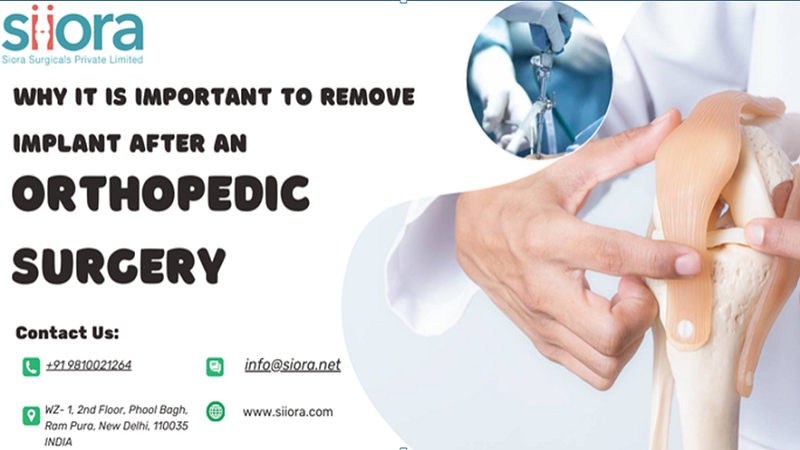Orthopedic implants are undoubtedly a boon for the orthopedic fraternity. Though they have been used for centuries, continuous improvements in their design and structural configurations have delivered great results. They are manufactured using medical-grade stainless steel and titanium alloy as per ISO standards. Besides this, non-metal variants are also available.
Serious fractures often require surgery for the stabilization of broken bone pieces in their right anatomy. Different types of orthopedic devices are there that are designed according to different shapes, sizes, & anatomies of bones present in our body. Some of the commonly used trauma implants are locking plates, PFNA ortho nails, Herbert bone screws, and others.
Sometimes, it is important to remove the orthopedic implant once the fracture has healed. In this post, we will discuss the importance of implant removal after orthopedic surgery.
What Are the Indications for Implant Removal?
It is a fact that in most cases, the implant stays inside the body forever, but sometimes, the removal of the implant becomes necessary. Some of the cases where implant removal becomes necessary include:
- Failure of implant placement
- Pain & pressure at the site of insertion along with mental irritation
- Allergic reactions
- Loosening of implants or unstable fixation
- Infection at the site of implant placement
- The discomfort experienced by the person at the insertion site
- When the metal implant rubs against the skin after placement
- Use of external fixators and K-wires
It won’t be wrong to say that the procedure of implant removal is difficult when compared to its placement. Therefore, there are chances of serious side effects after an implant removal surgery. If the complications occurred due to implant removal surgery are asymptomatic, the condition could be dangerous.
The decision to whether implant removal is feasible or not will be taken by the doctor after performing certain tests and evaluations. In most cases, the surgeons only try to perform implant removal surgery in case of emergency. This is where the implant is causing serious complications.
What Are the Complications Associated with Implant Removal Surgery?
Post-operative complications whether minor or major are always there with surgeries, and the same is the case with implant removal surgery. This process is risky, and that is why surgeons always try to avoid it as much as possible. Some of the common complications that may be noticed here include:
- Re-fracture after operation
- Damage to nerves and tissues
- Post-operative bleeding
- Joint stiffness
- Incomplete implant removal
- Deep vein thrombosis
- Anesthetic reaction
How Implants Are Removed?
As we have been discussing, the implant removal process is complex, and this is true for implants that have been applied deep into the bone.
To remove the implant, the doctor penetrates deep into the tissue. This is because, as the bone heals after an orthopedic surgery performed to treat the fracture, soft tissues and bones grow around the implant. Thus, deep penetration is necessary for the removal of the implant. Here, the wounds that occur after the removal surgery may take months to heal completely, and they are also at risk of infection. Scars may also remain after the surgery, and a second surgery may also be required to correct the scar. Besides this, one of the key things that need to be considered is that the cost of implant removal is very high.
Siora Surgicals Pvt. Ltd. is a CE-certified manufacturer of a wide range of trauma implants including implant removal set in India. The company is also looking to be counted as a reliable supplier for orthopedic implants in Argentina.




